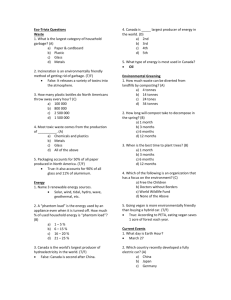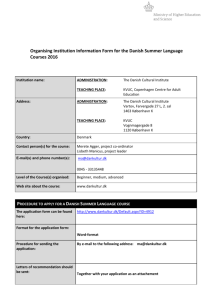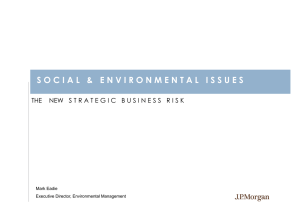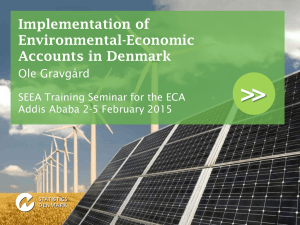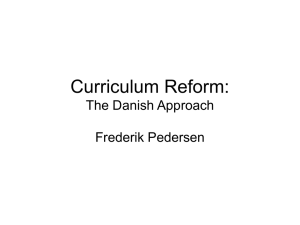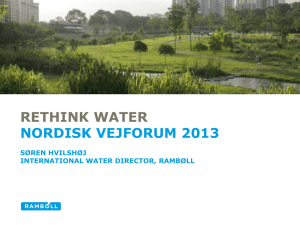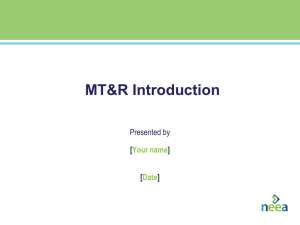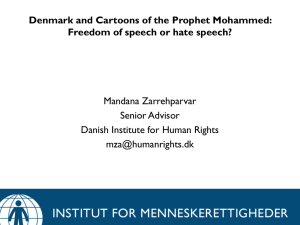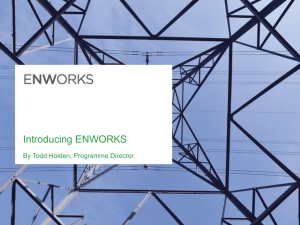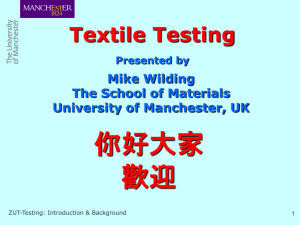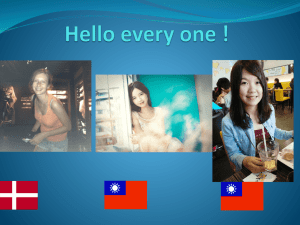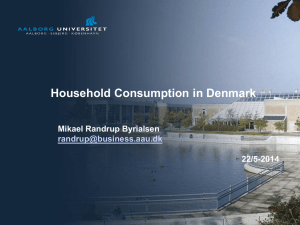Works to promote Danish fashion internationally
advertisement
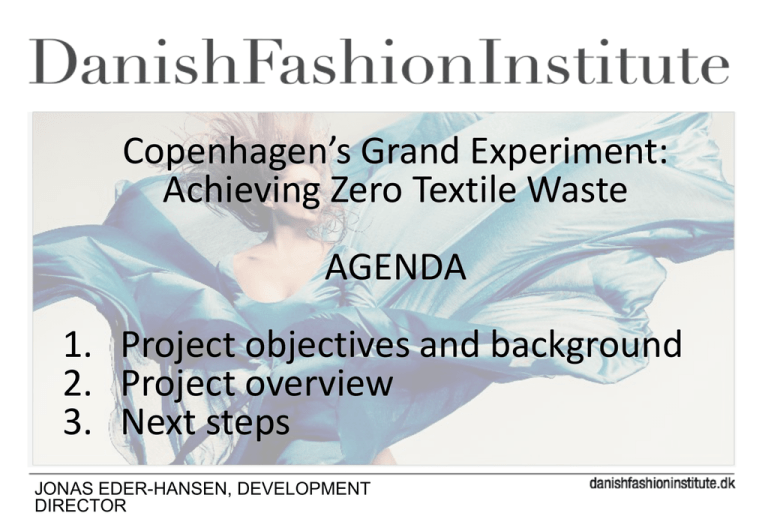
Copenhagen’s Grand Experiment: Achieving Zero Textile Waste AGENDA 1. Project objectives and background 2. Project overview 3. Next steps JONAS EDER-HANSEN, DEVELOPMENT DIRECTOR • A network organisation with 120 members • Works to promote Danish fashion internationally: • Contribute to knowledge sharing and development, innovation and an increase in exports • Gain international recognition for design, quality, and aesthetic values THE DANISH TEXTILE RECYCLING SYSTEM - PROJECT OBJECTIVES - PROJECT OBJECTIVES • • • • 45% => 90% return rate and increased re-use Minimised incineration rate Increased volume of ‘cream’ to charities Increased volume to recycling • Minimise risks in the supply chain • Minimise costs for raw materials • Create green growth (and jobs) • 100% transparency PROJECT BACKGROUND INCREASED SUPPLY CHAIN RISK COTTON INCREASED SUPPLY CHAIN RISK OIL FASHION = CONSUMPTION Social-Liberals: A refund and deposit system for apparel CURRENT FACTS (DK) • 89.000 tonnes textiles discarded per year (apparel and home textiles) • 33.000 tonnes (37%) are collected via charity containers and shops (10% goes to incineration and 50% are exported) • 7.000 tonnes (8%) are collected by private actors (43% goes to incineration and 57% is exported) • 24.000 tonnes (27%) are incinerated via household waste • 20.000 tonnes (23%) “gap” • 3.000 tonnes (3%) accumulation • 2.000 tonnes (2%) industrial waste MARKET POTENTIAL • There is a great potential for further collection of used textiles in Denmark – Between an extra of 24.000 tonnes (conservative) – and 48.000 tonnes (optimistic) – depending on business model and the ability to collect from households – potentially add another 20.000 tonnes of textiles currently being exported • Increased return percentage is dependent on the ability to compete with international market prices THE DANISH TEXTILE RECYCLING SYSTEM - PROJECT OVERVIEW - PROJECT OVERVIEW • Funded by a DKK 300K grant from the Market Development Fund under the Danish Business Authority • Project period: 6 months (phase 1: 1/1-26/6) • Project deliverables: Business case and business plan • Phase 2: 1 year funding to implement business plan – only 5 out of 9 qualify PHASE 1 STAKEHOLDERS • Consortium – IC Companys, Bestseller, Novotex, Katvig, City of Copenhagen, Danish Consumer Council, Danish Red Cross, DAKOFA, CradlePeople, Dansk Fashion and Textile • Charity organisations (Danish Red Cross, Salvation Army, UFF/Humana, Dan Church Social, Dan Church Aid etc) • FORCE Technology and Copenhagen Resource Institute • DAFI members THE DANISH TEXTILE RECYCLING SYSTEM - NEXT STEPS - POTETIAL PARTNERS PHASE 2 • NPO – a Public Private Partnership • Private: Bestseller, IC Companys, H&M, industry organisations, I:CO/SOEX Group, Novozymes (charity organisations) • Public: City of Copenhagen (+ other municipalities), Danish EPA, DPA System • Financing: max budget DKK 3,6 mio. kr. (2/3 cofinance needed, cash/in-kind) QUESTIONS? TIMEPLAN PHASE 2 • Launch during Copenhagen Fashion Week, 7-11 August 2013 • Pilots/tests in 1-3 cities, December 2013 – February 2014 (Copenhagen + 1-2) • Evaluation/results, March-April 2014 • Copenhagen Fashion Summit, 23-24 April 2014 • Implementation in 1-3 cities, May-July 2014
